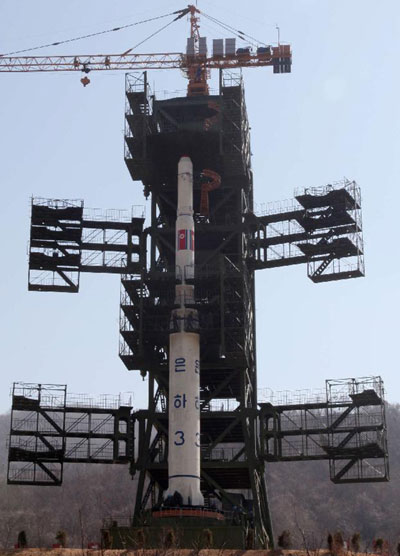DPRK satellite launch plans trigger concern
 0 Comment(s)
0 Comment(s) Print
Print E-mail China Daily, December 3, 2012
E-mail China Daily, December 3, 2012
The Democratic People's Republic of Korea's satellite launch plan triggered widespread concern from regional countries on Sunday, with Pyongyang intending to implement the plan between Dec 10 and 22.
With the satellite launch, the DPRK is attempting to grab the attention of the international community, rather than intensify the situation on the Korean Peninsula, said Wang Fan, a professor at China Foreign Affairs University in Beijing.
The isolated DPRK needs a favorable international atmosphere to develop its domestic economy, and it is warning the international community to take seriously and hold talks with the country, said Wang Junsheng, a researcher of East Asian studies with the Chinese Academy of Social Sciences.
|
|
|
Photo taken on April 8, 2012 shows the Unha-3 rocket for launching Kwangmyongsong-3 satellite installed on the launch pad in Tongchang-ri base, Cholsan County, North Phyongan Province, the Democratic People's Republic of Korea(DPRK). [Photo: Xinhua] |
Photo taken on April 8, 2012 shows the Unha-3 rocket for launching Kwangmyongsong-3 satellite installed on the launch pad in Tongchang-ri base, Cholsan County, North Phyongan Province, the Democratic People's Republic of Korea(DPRK). [Photo/Xinhua]
According to a report on Saturday from the DPRK's Korean Central News Agency, a spokesman for the Korean Committee for Space Technology said the country intends to launch a working satellite — a second version of the Kwangmyongsong-3.
The launch plan has sparked concerns from the United States and its major allies in Asia, who condemn it as "provocation", while China also showed its concern and called for calm.
Chinese Foreign Ministry spokesman Qin Gang told media on Sunday that China urged relevant parties to prevent the matter from escalating, and urged peace and stability on the Korean Peninsula to be maintained.
The DPRK has the right to peacefully use the space, but the right is limited by United Nations Security Council resolutions, Qin said.
US State Department spokeswoman Victoria Nuland said in a written statement that the launch "would be a highly provocative act that threatens peace and security in the region", while Pentagon spokesman George Little urged Pyongyang to abide by its international obligations under UNSC resolutions.
Pyongyang said it will fully comply with relevant international regulations and usage, but Washington insisted that Pyongyang's satellite launches are a cover for tests for long-range missile technology designed to strike the US.
According to UN regulations, the DPRK must "not conduct any further nuclear test or launch of a ballistic missile".
ROK President, Lee Myung-bak, also warned the launch would be a violation of UN resolutions, reported ROK's Yonhap News Agency on Sunday.
Yonhap quoted Lee as saying that the DPRK is "working hard to influence the upcoming election", but the election will not be affected.
Pyongyang is trying to affect the ROK election with the launch, hoping it will lead to leaders in Seoul taking softer stance on the DPRK, Wang Fan said.
"But the launch is a double-edge sword that will also result in a new round of sanctions from the international community against the DPRK."
He added that a successful rocket launch would also raise Pyongyang's bargaining power with the US and the ROK.
In Japan, Prime Minister Yoshihiko Noda on Sunday vowed unwavering determination to handle the "crisis" brought by Pyongyang's launch, despite Japan being in the middle of political turmoil before their general election on Dec 16.
On Saturday, Noda said that talks between senior diplomats from Japan and the DPRK, which were scheduled for Wednesday and Thursday in Beijing, will be postponed, Kyodo news agency reported.
Although the DPRK said it has chosen a safe flight path for the launch so that parts of the carrier rocket that might fall during the launch process would not affect neighboring countries, Japan is still maintaining "strong vigilance".
On Saturday, Japanese Defense Minister Satoshi Morimoto ordered the military to prepare to shoot down the rocket if it, or part of its debris, looked likely to land in Japanese territory, Japan's Jiji Press said.







Go to Forum >>0 Comment(s)